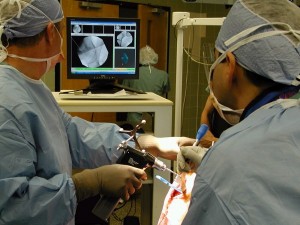
PLYMOUTH MEETING, PA—What issues have been on the minds of healthcare decision makers most recently? High-tech issues. Healthcare decision makers consider computer-assisted imaging and robotic technology procedures and equipment as important, according to ECRI Institute® (www.ecri.org), an independent, nonprofit organization that researches the best approaches to improving patient care.
In a top-ranked list of reports and articles accessed by members of ECRI Institute Health Technology Assessment Information Service™ (HTAIS™), the cross-cutting theme for both hospitals and health plans is what these high-tech technologies may bring in terms of improved patient management and safety, health outcomes, and costs of care.
In order of ranking, the most viewed articles and reports by HTAIS members were:
Image-Guided Radiation Therapy Systems (Health Technology Assessment report)
Robotic Surgical System with Telesurgery Capabilities (Health Technology Trends article)
Computer-Assisted Propofol Anesthesia System (Health Technology Trends article)
Noncontact, Low-Frequency Ultrasound for Treatment of Chronic Wounds (Health Technology Assessment Report)
Wearable Artificial Kidney (Health Technology Forecast profile)
“While hospitals and health plans may be exploring these reports for different reasons, they’re both clearly interested in patient outcomes from the adoption of these technologies,” says Diane Robertson, director, health technology assessment information service, ECRI Institute. “Hospitals are also seeking unbiased guidance to help them figure out whether they should be planning for or investing in these technologies at all, and if so, how to prioritize large capital purchases.”
The organization has a rich history of providing assessments to hospitals, health systems, the U.S. Centers for Medicare & Medicaid Services and other federal agencies, as well as ministries of health and hospitals worldwide. To maintain objectivity in its research and publications, ECRI Institute requires all its employees to adhere to strong conflict-of-interest policies that keep employees at arm’s length from medical product/pharmaceutical/biotechnology manufacturers and health plans.
For more information about ECRI Institute’s Health Technology Assessment Information Service, visit www.ecri.org/htais, call (610) 825-6000, ext. 5060, e-mail htais@ecri.org, or write to 5200 Butler Pike, Plymouth Meeting, PA 19462.
For more information, contact:
Laurie Menyo
(610) 825-6000, ext. 5310
lmenyo@ecri.org